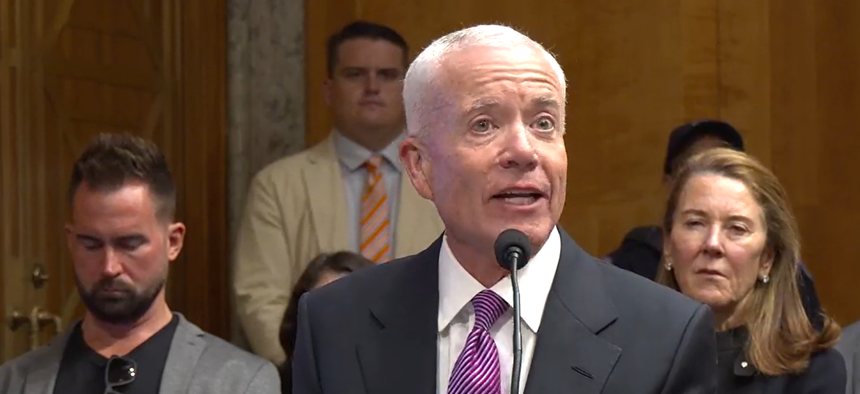
Edward Forst testifies before the Senate Homeland Security and Governmental Affairs Committee on Thursday, October 23, 2025. hearing screenshot
GSA will be ‘multiplier for efficiency and modernization,’ nominee for administrator says
Edward Forst, President Trump’s nominee to lead the General Services Administration, testified before the Senate Homeland Security and Governmental Affairs Thursday.
Edward Forst, who President Trump nominated to oversee the General Services Administration, laid out his priorities to senators Thursday, vowing the agency will serve as a “multiplier for efficiency and modernization” with a focus on four priority areas.
“If given the opportunity to serve and lead GSA, I will focus the agency on four central priorities: right-sizing our federal real estate portfolio, unifying our federal acquisition system, encouraging and promoting more small businesses to do business with the federal government, and leading the way for a technology transformation across federal agencies,” Forst said in written testimony submitted to the Senate Homeland Security and Governmental Affairs.
Forst previously served as chairman of Lion Capital, is a longtime Goldman Sachs alum and worked as a senior advisor for the Treasury Department for one year in 2008. He was nominated by Trump in August to ultimately succeed acting GSA Administrator Michael Rigas after a leadership shakeup within the agency, which itself went through a significant workforce reduction.
In his testimony, Forst acknowledged GSA’s mission to make government more efficient and effective has expanded over time, extending “far beyond office space and supply contracts” to provide essential services in acquisition, real estate, transportation and information technology across federal agencies.
Once a quiet agency that mostly operated behind the scenes and out of the spotlight, GSA in the second Trump administration has taken a leading role across government. In March, Trump centralized the procurement of more than $400 billion worth of goods and services under GSA, and the agency is directly involved in rewriting Federal Acquisition Regulation rules that dictate how the government purchases everything from pencils to quantum computing technologies.
Forst said the government’s acquisition system “must operate as a unified enterprise, not as a patchwork of disconnected transactions,” and expressed a desire to “make it easier for innovative and small companies to do business” with the government by “simplifying regulations and removing unnecessary barriers.”
“I am confident the Federal Acquisition Service team is prepared to fully embrace this once in a generation opportunity that will help agencies improve their mission delivery,” Forst said. “When procurement works intelligently, every hardworking taxpayer wins.”
Forst called technology modernization “a necessity,” and said GSA will continue playing an important leadership role in executing Trump’s AI Action Plan. GSA stood up USAI.Gov over the summer in response to the action plan to serve as a centralized, secure evaluation suite for agencies to safely adopt generative AI services through. The platform allows agencies to experiment with a variety of modern AI tools from cutting-edge companies.
Meanwhile, the agency has secured more than a dozen deals since April with multiple companies to discount software to government customers through its OneGov initiative.
Homeland Security and Governmental Affairs Committee Ranking Member Gary Peters, D-Mich., took issue with one of those companies — xAI — which inked a deal with GSA for its Grok AI service in September.
“This deal occurred following reports that broke [that Grok] had produced racist and anti-semitic content widely across most social media platforms,” said Peters, referencing posts the chatbot made on July 8 that its parent company later apologized for. Peters asked Forst to commit to pause the use of Grok “until we receive documentation about the details of the procurement, including whether the GSA actually performed a comprehensive risk assessment.”
“My commitment to you is I will meet with the team, and I’ll understand the process used in selecting them, and I’ll make sure that we have all the facts. If there was incompleteness in the process, we’ll rectify that,” Forst said.
Forst fielded several questions from Sens. James Lankford, R-Okla., and Joni Ernst, R-Iowa, about his plans to address the federal government’s real estate portfolio. Forst said he aims to right-size the government’s massive portfolio of 8,800 owned or leased properties in nuanced fashion.
“I think we have to take stock of exactly what we own, the mission of each one of our constituent clients and then determine the appropriate way to move forward,” Forst said. “GSA is the tip of the spear in federal real estate.”







